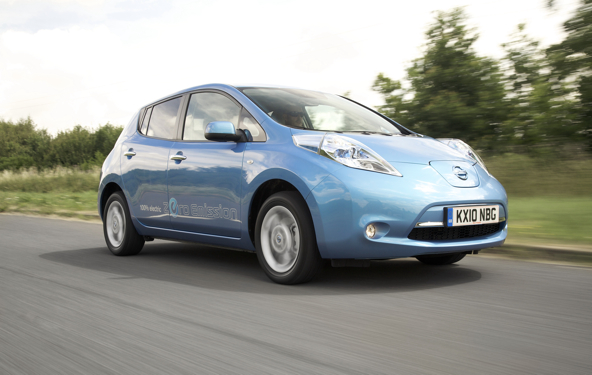Scots drivers not so green 03 | 01 | 2011

SO, TWO OF SCOTLAND'S largest players in the electric vehicle market have called on political parties in Scotland to help the industry "step up a gear" in the build-up to this year's Holyrood elections.
Now, two things strike me immediately about this. The first is the companies — Glasgow-based Allied Vehicles and Dundee battery maker Axeon, who have joined forces with environmental charity WWF Scotland — have taken advantage of a quiet news day at the start of the year to grab some cheap headlines.
The second, and perhaps more important, is that both these companies stand to benefit commercially and directly by any 'support' Hollyrood delivers to the electric vehicle industry.
In partnership with the Dunkeld-based WWF Scotland — yes, WWF Scotland is part of the international WWF network, one of the world's "most influential environmental organisations" — the trio are calling for the roll-out of more electric vehicles (EVs) and public charging points.
In their message, the group have challenged political parties to outline how they would help deliver the "widespread and rapid take-up of EVs" as part of their manifesto commitments in the run-up to May's Scottish Parliament elections.
Now before we go any further, where is the basis for this alleged "widespread and rapid take-up of EVs"? Quite simply, there are no foundations for any "widespread and rapid take-up of EVs" to manifest itself in Scotland over the next five-to-seven years at least?
Why? Simply because despite all the political and environmental posturing being taken by bodies such as WWF Scotland — and supported by commercially-interested companies such as Axeon and Allied Vehicles — the battery technology simply does not exist to make EVs viable. Plus, they are inherently expensive.
Green lobbyists will immediately throw their arms in the air and pontificate about climate change and threats to natural resources. But first, let's consider the 'best' the industry currently has to offer drivers; the Nissan Leaf (pictured), which goes on sale in a few weeks.
First costs. It'll set you back £23,995, and that's after you receive the Government's £5000 subsidy. That subsidy, of course, is taxpayers' money which has essentially come from you and me.
Secondly, the battery and the Leaf's range. Nissan says the Leaf should manage 160km, that's about 100 miles, on one full charge which should be enough for a generous daily commute; after an eight-hour overnight recharge ,it's ready to do it again.
And if your Leaf needs feeding on a longer journey, you can give it a "quick charge" – typically a half-hour blast at 400 volts and 32 amps – which should take the charge back up to 80%. Take the charge higher than this and you risk damaging the lithium-ion battery pack.
Of course, all this assumes you have found a suitable charging point. Currently there are very few, but in the next few years we should see more of them springing up in shopping centres, service stations, entertainment complexes, municipal car parks and roadside parking bays.
All very well, but the big problem though comes when you start driving the car in the real world. Colleagues drove the Leaf at its international launch started the 30km test route with the Leaf fully charged and showing a range of 140km.
A short distance round the 30km route — which included motorway, town and country driving — for a second time, the dashboard display which showed the remaining range indicated the battery only enough energy to cover 40km. More worryingly the electronic woman's voice, which urges you to find a recharging station, issued her instruction 10km from the end of the second circuit; that was after only 50km!
What also has to be factored in is that the range figures quoted by the manufacturers are those covered in perfect conditions. Turn on the headlights, air-conditioning, wipers and/or radio and you're range immediately plummets even further.
So, WWF Scotland (which flies the campaigning flag for all things environmental), Allied Vehicles (which builds EVs), and Axeon — which just happens to be one of Europe's biggest producers of Lithium-ion battery packs for EVs — have united to put pressure on the Scottish Government, essentially seeking investment directly in an industry they supply.
A report published last April by WWF Scotland claimed that at least one in 10 vehicles on Scotland's roads must be electrically powered if the country is to reach its target of cutting greenhouse gas emissions by at least 42% by 2020. That, simply, just isn't going to happen.
And WWF Scotland said it is commissioning research to look at the opportunities available to both central and local government to support the necessary increase in electric cars on Scotland's roads.
If there is a route for the expansion of EVs across Scotland and the UK, it is via the government bodies and local councils where pilot programmes with EVs are already taking place.
Glasgow City Council has joined forces with partners, including ScottishPower, Allied Vehicles and Axeon, to trial 40 EVs and supporting infrastructure. Drivers were chosen by the city council to try out the cars, which can be charged at home or at 40 public charging points.
Data from the EVs will be analysed at Strathclyde University and fed into a study about the up-take of electric vehicles, using details from eight other pilot schemes around the UK.
Perhaps once the findings from these pilot cars are analysed and published, we'll have a slightly better indication of how viable — or not — the current batch of electric vehicles are.
Cynics will no doubt question those findings, as once again they are being generated by interested parties. But what is without question is the current battery technology is far from reaching, or achieving, the daily power needs required to complete an average day's driving.
Keep up-to-date with all the latest news by following us on twitter.com/scotcars
Jim McGill